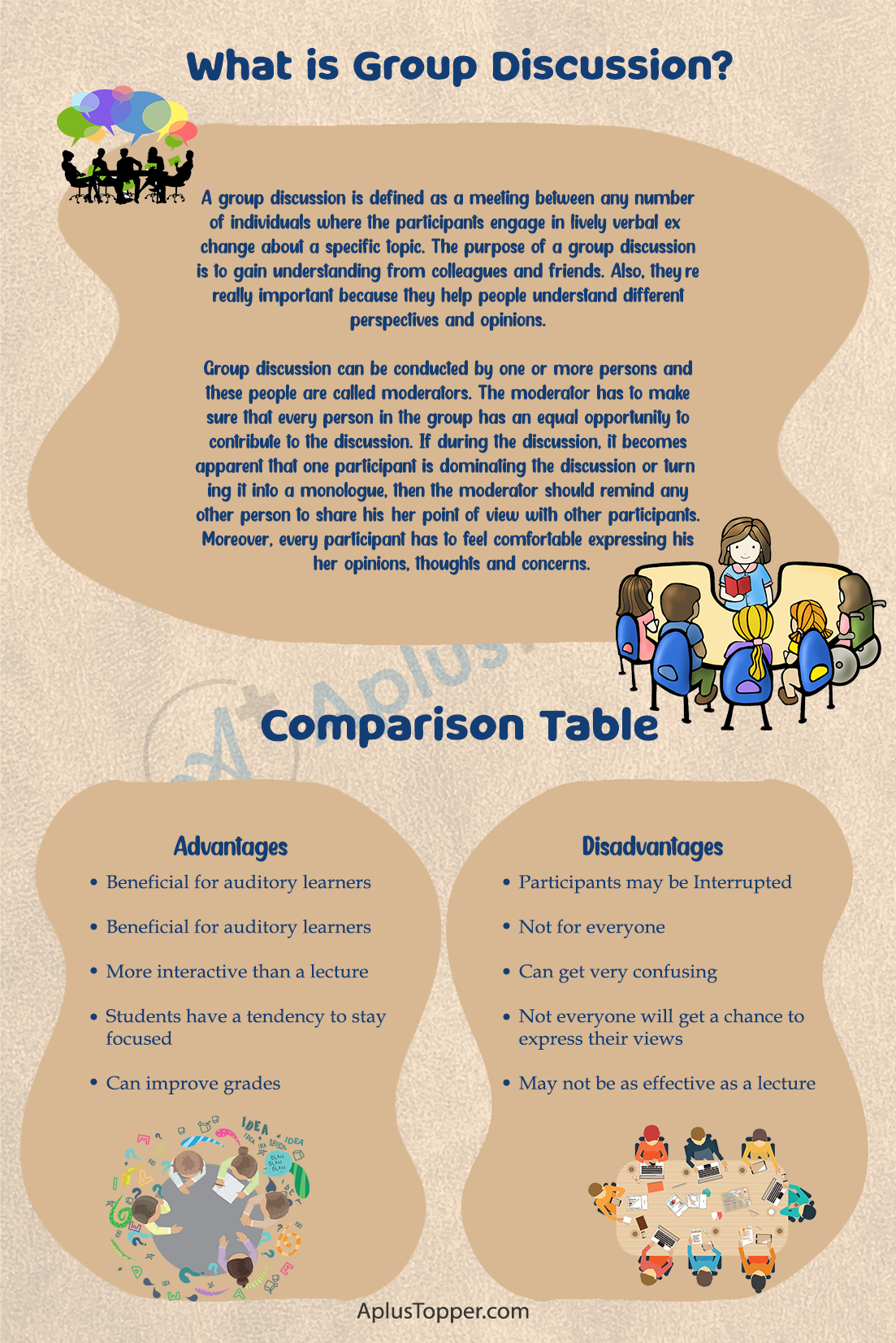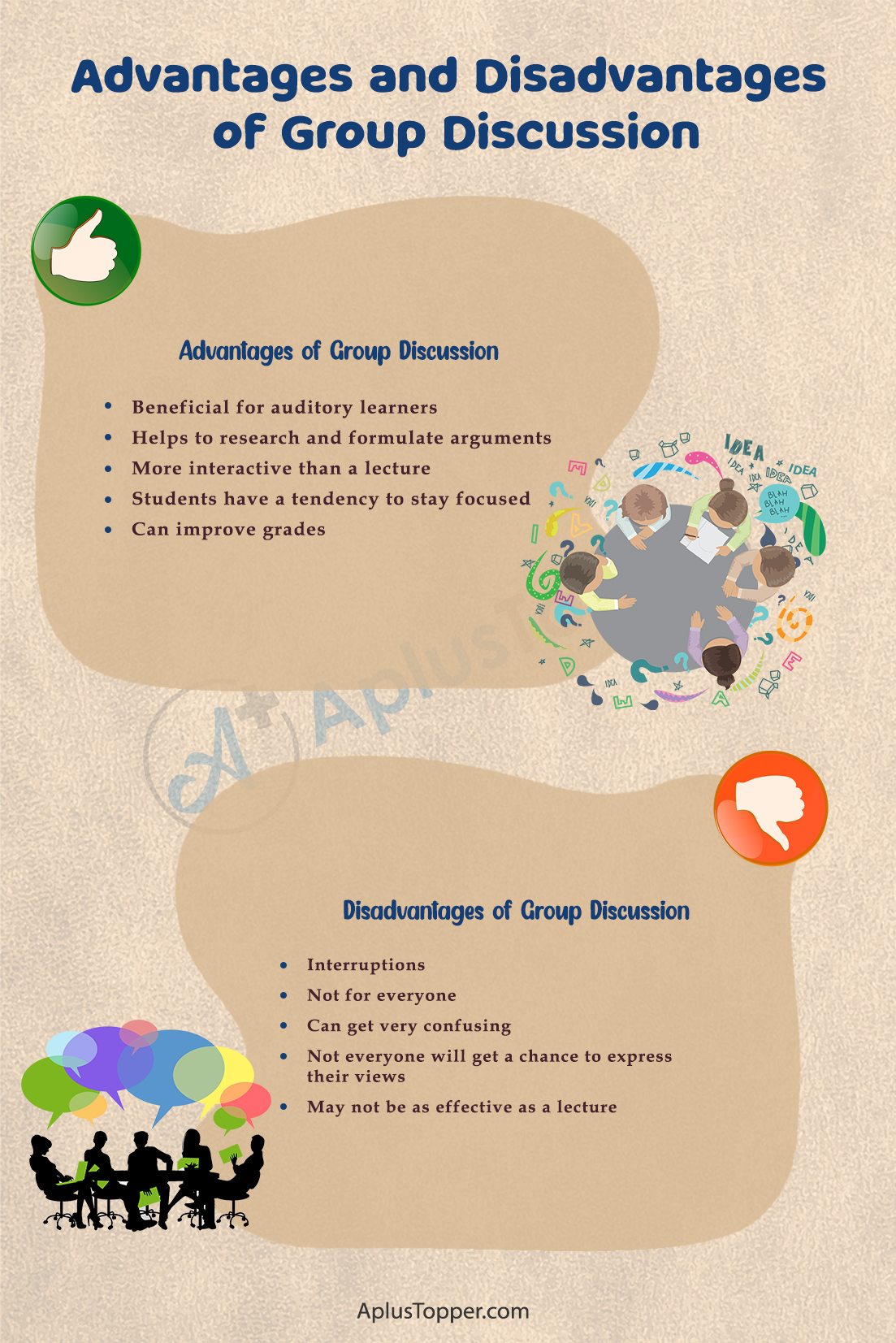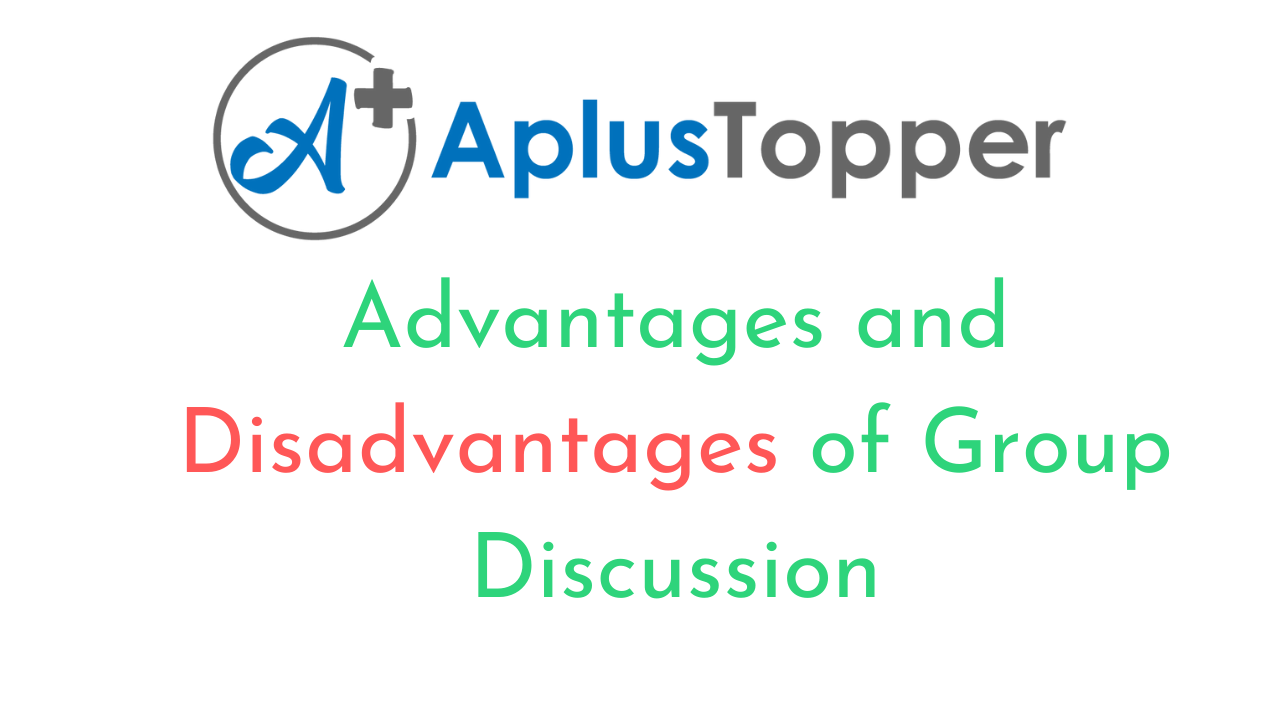Group Discussion Advantages And Disadvantages: When does learning in a group discussion actually work? Group discussions are an important part of the collaborative and cooperative learning process, but not every student will have similar experiences. In this article, we shall explore the meaning of group discussion, its implications, tips, advantages and disadvantages.
A group discussion is defined as a meeting between any number of individuals where the participants engage in lively verbal exchange about a specific topic. The purpose of a group discussion is to gain understanding from colleagues and friends. Also, they’re really important because they help people understand different perspectives and opinions.
Students can also find more Advantages and Disadvantages articles on events, persons, sports, technology, and many more.
Group discussion can be conducted by one or more persons and these people are called moderators. The moderator has to make sure that every person in the group has an equal opportunity to contribute to the discussion. If during the discussion, it becomes apparent that one participant is dominating the discussion or turning it into a monologue, then the moderator should remind any other person to share his/her point of view with other participants. Moreover, every participant has to feel comfortable expressing his /her opinions, thoughts and concerns. Also, each participant in the discussion should be able to express his/her opinion without being interrupted by the other participants.
- Advantages of Group Discussion
- Disadvantages of Group Discussion
- Comparison Table for Advantages and Disadvantages of Group Discussion
- Conclusion on Group Discussion Advantages And Disadvantages
- FAQ’s on Group Discussion Advantages And Disadvantages
Advantages of Group Discussion
Group discussions are a great way to create an engaging environment and foster collaboration among students. However, they can also be a lot of work for the teacher. Making sure everyone participates is difficult and making sure students are on-task can be challenging. With all that in mind, group discussions have many benefits like developing critical thinking skills and building social skills. Other advantages of group discussion are as follows:
- Beneficial for auditory learners – In a group discussion, all participants have the opportunity to share their ideas and opinions. This style makes sense for auditory learners because they learn best through hearing their own voice and from listening to others speak. This type of learning also benefits visual learners, who are able to see what is being discussed in real time.
- Helps to research and formulate arguments – In order for students to learn in a group discussion, the teacher has to pose questions that will lead to fruitful conversation. If done well, the class can learn how to research and formulate arguments for a topic. Furthermore, it makes sure that all students are actively participating in the class which will work as a great way for them to form new friendships with other people in their grade.
- More interactive than a lecture – Group discussion is great for a variety of reasons. It stimulates the brain in a way that a lecture does not. It also fosters empathy and understanding because people are less likely to judge each other. Even if a student is shy, they will probably find their voice in a group discussion because it’s more collaborative than aggressive.
- Students have a tendency to stay focused – Students in a group discussion have a tendency to stay focused on the discussion, which may lead to more learning. They are able to share what they know and learn from others in the group. If someone doesn’t know the answer or if an answer is incorrect, other students will call them out on it. This encourages students to do their research and be prepared for class discussions.
- Can improve grades – Group discussion classes provide an opportunity for students to ask questions and make observations. They are less likely to feel embarrassed or ashamed because they know that others in the class share these same feelings. The teacher can then answer student’s questions and clarify misconceptions, which ultimately leads to better grades because they know that the teacher is there to support them.
Disadvantages of Group Discussion
When students are in groups, they have the opportunity to share their thoughts and experiences with others. However, it is important to keep in mind that there are disadvantages of group discussions. For example, the group might not have the same goals or viewpoints as another group member. Other challenges in group discussion are as follows:
- Interruptions – Group members tend to interrupt one another and give answers too quickly. This can make it difficult to come up with ideas.
- Not for everyone – Group discussion isn’t for everyone. For example, some people might not be comfortable speaking in front of a group and may also not be able to contribute as much due to anxiety. Others may find that they cannot finish their participation in the discussion due to time constraints.
- Can get very confusing – Group discussions are wonderful ways to spark ideas and facilitate discussion. However, they can also get very confusing when the group is large or the number of topics being discussed is quite high. It is easy for everyone to get mixed up and not know what they’re talking about.
- Not everyone will get a chance to express their views – In a group discussion, not everyone will get a chance to express their views. Some people may feel that they are being ignored or that their opinion is not as important. When someone doesn’t speak up, it could be because they’re nervous, shy, or forgot what they wanted to say.
- May not be as effective as a lecture – Group discussions are a time-consuming method of teaching and often less effective than lectures. Lectures are quick and easy to produce, while group discussions have a lot of time required in them. Lectures also allow you to teach more than one at once, while group discussion is limited in the number of people it can reach. Lectures can also be recorded for later use and consumption which is not possible with group discussions.

Comparison Table for Advantages and Disadvantages of Group Discussion
Following are the advantages and disadvantages of Group Discussion.
| Advantages | Disadvantages |
| Beneficial for auditory learners | Participants may be Interrupted |
| Helps to research and formulate arguments | Not for everyone |
| More interactive than a lecture | Can get very confusing |
| Students have a tendency to stay focused | Not everyone will get a chance to express their views |
| Can improve grades | May not be as effective as a lecture |

Conclusion on Group Discussion Advantages And Disadvantages
Group discussion is a powerful tool for developing class discussions. It helps to increase participation in the classroom, especially for students who may not feel comfortable speaking up in front of the whole class. Lastly, group discussions are a great way to build relationships with other people and to work on critical thinking skills. They may not be the most efficient or even reliable means for learning, but they are an invaluable resource for anyone who wants to succeed in an academic environment.
FAQs on Group Discussion Advantages And Disadvantages
Question 1.
What is a Group Discussion?
Answer:
Group discussion is a form of learning. Group discussions typically happen in classrooms and are led by the teacher. The discussion follows a set of ground rules like respecting others’ opinions, not interrupting, and being honest about what you know.
Question 2.
What are the advantages and disadvantages of Group Discussion?
Answer:
Group Discussion allows students to become more familiar with topics and answers. Group Discussion is also an excellent method of connecting with others in the class. Additionally, it helps students see different perspectives on topics. The disadvantages are that it can be hard to stay on task and keep up with the discussion. Furthermore, some students may not have time to contribute for the Group Discussion.
Question 3.
What is the importance of Group Discussion?
Answer:
Group discussion is one of the most popular ways of teaching and learning in colleges and universities. It fosters cooperation, encourages participation, and sharpens communication skills. Group discussion also enables students to apply what they learn in class to real-life situations.
